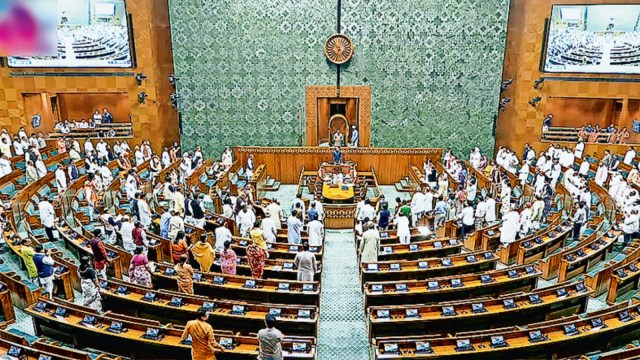Opinion Seven issues raised by MPs in Parliament
The subjects may have not made multi-column stories or news tickers but are serious interventions on citizen welfare
 A look at some of the interventions by MPs, across party lines, on issues that affect the lives of citizens.
A look at some of the interventions by MPs, across party lines, on issues that affect the lives of citizens. Parliament session after Parliament session, a few things change. The coffee spoons have moved from Central Hall to the seemingly swank, yet soulless, corridors of a modern-day cafeteria. Heritage can’t be traded in for the Hyatt-like. In the about-to-be-concluded Budget session, a few Members of Parliament were spotted wearing white kicks. Kangana Ranaut is the photo journalist’s top shot.
In all this hubbub, it is the MPs who are seated in the first two rows of Lok Sabha and Rajya Sabha – from the five biggest parties – who tend to dominate news output. Almost by way of some unspoken rule, issues picked up for coverage by the channels and newspapers are centred mainly around the political. What this often means is that the lesser an issue scores on the “political quotient”, the fewer its chances of dominating a narrative. Here are seven such issues recently raised by MPs across political parties. The subjects may have not made multi-column stories or news tickers, but are serious interventions on citizen welfare.
Road Accidents on Highways, Ghanshyam Tiwari, BJP
In the last five years, about 8 lakh people have died in highway accidents in India. About half of unnatural and untimely deaths in India happen due to road accidents. Per the government’s own admission in Parliament, we have failed to achieve the target of reducing road accidents by 50 per cent.
Rehabilitation for Acid Attack Victims, Sanjay Singh, AAP
In the last 11 years, 200 women have been survivors of acid attack cases. One-third of the victims are girls below 18 years of age. Survivors have often struggled to secure justice for themselves in a timely manner, with some cases going up to 20 years. In 2015, the Supreme Court ordered completely free medical treatment for acid attack victims. What’s the compensation that victims get? Just 5 lakh rupees.
Blood Transfusion for Thalassemia Patients, Sagarika Ghose, AITC
India faces serious shortages in the supply of healthy uninfected blood for transfusions. We require 14.6 million units of blood each year and fall short by 7 million units. Around 1,50,000 Thalassemia patients depend on such transfusions for survival. Shortages in supply interrupt the transfusion cycles for these patients. Life-saving drugs for thalassemia patients are also reported to be in short supply. Lack of awareness about blood transfusion and associated health benefits often leads to preconceived notions and reluctance about blood donations. There is an urgent need to strengthen screening protocols to ensure a sufficient supply of healthy uninfected blood.
Safety of School Transport, Fauzia Khan, NCP-SP
As of 2021, one out of two vehicles used as school transport do not have seat belts, speed governors, or transport managers. Three out of four parents surveyed were not able to verify if GPS and CCTVs were active in school buses. Vehicles used for school transport in India excessively lack safety equipment and first aid kits. These vehicles also often lack emergency contact information, enabling reckless driving. Despite one of the highest number of road accidents, India doesn’t have a comprehensive policy on school transport safety.
Drug Addiction Amongst Children, Ajeet Madhavrao Gopchade, BJP
Drug addiction among children, especially poor children is a rising cause for concern. What drugs are children accessing? Pain relief balms on bread, fevicol, paint, petrol, diesel, turpentine, nail polish remover, multiple kinds of cough syrup and many more easily available substances. These substances cannot be and are not prohibited for sale, making legal remedies close to impossible. As of 2022, 1.5 crore children between 10-17 were addicted to such substances.
Low-cost Gene Therapy for SMA, Haris Beeran, IUML
most read
Spinal Muscular Atrophy (SMA) is an incurable and rare genetic disorder affecting 8,000 to 25,000 Indians annually. SMA affects nerve cells in the spinal cord and is fatal if untreated. Gene therapy medicine, used to treat the disease in infants below two years of age, costs 17 crore rupees. Molecule therapy, requiring 30 bottles of medicine annually, costs 6.2 lakh rupees per bottle. The National Policy for Rare Diseases (2021), stipulating local manufacture of drugs for rare diseases, must be pushed into action to save precious lives battling SMA.
Crisis of Plastic Pollution, Ayodhya Rami Reddy Alla, YSRCP
The Central Pollution Control Board estimates that India generates 3.5 million tonnes of plastic waste each year. About half of that waste is collected, of which 50 per cent is recycled. Where does the rest of the plastic waste go? Landfills, rivers, oceans. What doesn’t end up here is burnt, contributing to air pollution. Plastic ends up in the air that we breathe, the water that we drink, and the food that we eat. Failure to recycle plastic is also an economic problem. India imports more than 80 per cent of crude that is also used to make plastics. Recycling plastics effectively can save at least Rs 50,000 crore annually.
The writer is MP and leader, All India Trinamool Congress Parliamentary Party (Rajya Sabha)





